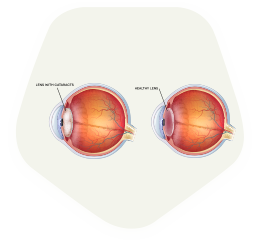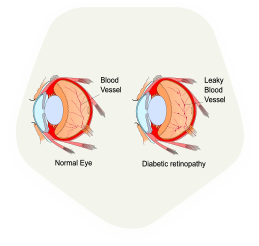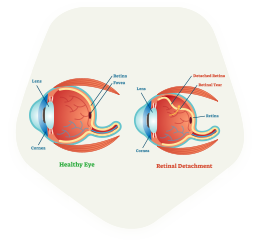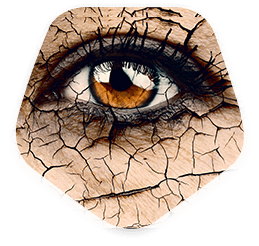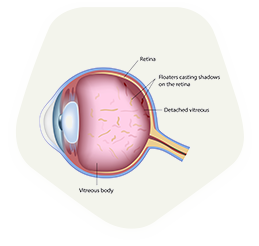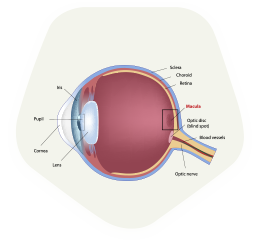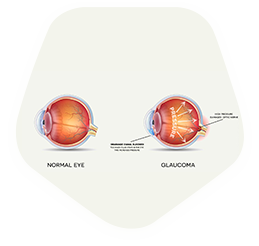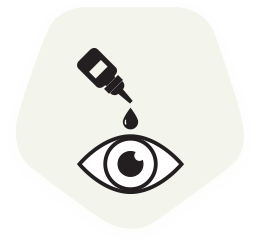Adult macular degeneration is traditionally described as a form of the disease that affects individuals over the age of 55.
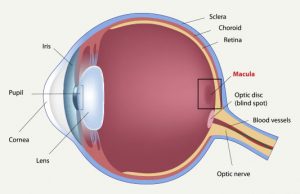
However, we have recently discovered that a significant number of these individuals may have a major genetic component that contributes to the disease.
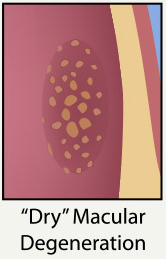
Dry macular degeneration, in which the cells of the macula slowly begin to break down, is diagnosed in 90 percent of cases. Yellow deposits called “drusen” form under the retina between the retinal pigmented epithelium (RPE) and Bruch’s membrane, which supports the retina. Drusen deposits are “debris” associated with compromised cell metabolism in the RPE and are often the first sign of macular degeneration. Eventually, there is a deterioration of the macular regions associated with the drusen deposits, resulting in a spotty loss of “straight-ahead” vision.
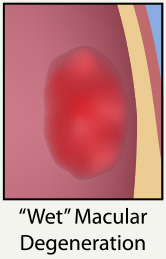
Wet macular degeneration occurs when abnormal blood vessels grow behind the macula, then bleed. There is a breakdown in Bruch’s membrane, which usually occurs near drusen deposits. This is where the new blood vessel growth occurs (neovascularization). These vessels are very fragile and leak fluid and blood (hence “wet”), resulting in scarring of the macula and the potential for rapid, severe damage. “Straight-ahead” vision can become distorted or lost entirely in a short period of time, sometimes within days. Wet macular degeneration accounts for approximately 10 percent of the cases; however, it results in 90 percent of legal blindness.
What does macular degeneration do to your vision?
Macular degeneration is the imprecise historical name given to that group of diseases that cause sight-sensing cells in the macular zone of the retina to malfunction or lose function.
What are the symptoms of macular degeneration?
Macular degeneration can cause different symptoms in different people. Sometimes only one eye loses vision while the other eye continues to see well for many years. The condition may be hardly noticeable in its early stages. But when both eyes are affected, reading and close-up work can become difficult.
What can you or your loved one do if diagnosed with macular degeneration? First it is important to modify those environmental risk factors that we know about.
You should:
- Detail a low-fat, low cholesterol diet.
- If you are post-menopausal, you should consult with your physician concerning estrogen replacement therapy. This may have a favorable impact upon cholesterol lipid levels that play a role in worsening the disease.
- Wear sunglasses with UV protection.
- Try to consume at least two servings of leafy dark green vegetables per day.
- Do not smoke and avoid exposure to secondhand smoke.
- Eat food and/or supplements rich in vitamins E and C and lutein. Lutein is a plant antioxidant found in high quantities in spinach, kale and other dark green, leafy vegetables.
Our macular degeneration patients come to us from Boston, Danvers, Lynn, Marblehead, North Shore Boston, Peabody, Salem and Swampscott. We provide the following products and services:
- Eyeglass designer frames
- Men’s eyeglass frames
- Eyeglass frames for women
- Prescription eyeglasses
- Prescription sunglasses
- Polarized sunglasses
- Transitions lenses
- Men’s sunglasses
- Sunglasses for women
- Designer sunglasses
- Progressive lenses
- Eye contact lenses
- Soft contact lenses
- EyeMed Vision Care and VSP vision plans
- VSP doctors
Are you suffering from macular degeneration? Call us at (978) 745-2774 or fill out our online Request an Appointment form. We’ll be glad to accommodate you.



